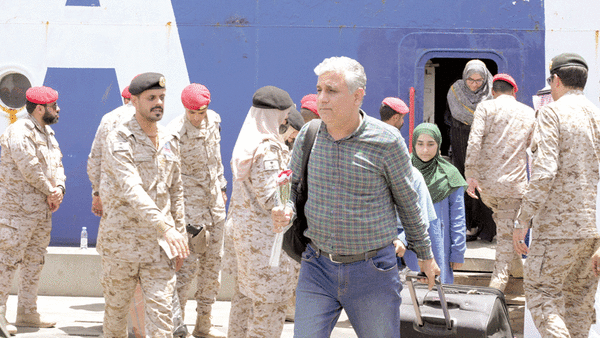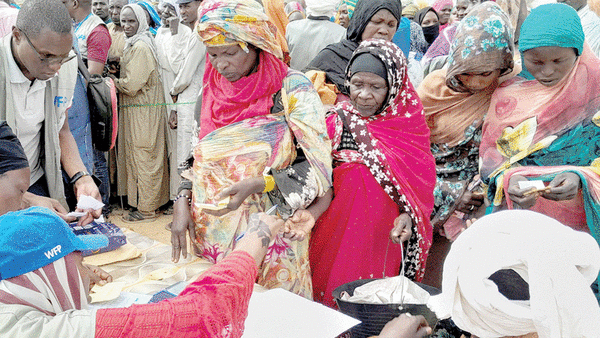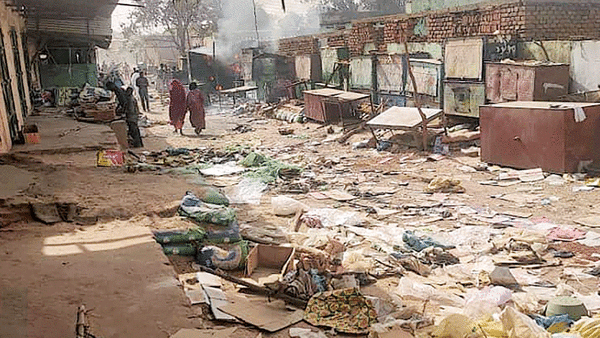

They both think they will win, but they are both sort of more open to negotiations, the word ‘negotiations’ or ‘talks’ was not there in their discourse in the first week or so
Volker Perthes
UN special representative
in Sudan

KHARTOUM: The sounds of air strikes, anti-aircraft weaponry and artillery could be heard in Khartoum early on Saturday and dark smoke rose over parts of the city, as fighting in Sudan entered a third week.
Fighting between the army and a rival paramilitary force continued despite the announcement of a 72-hour ceasefire extension on Friday, when strikes by air, tanks and artillery rocked Khartoum and the adjacent cities of Bahri and Ombdurman.
Hundreds have been killed and tens of thousands have fled for their lives in a power struggle between the army and the paramilitary Rapid Support Forces (RSF) that erupted into violence on April 15, derailing an internationally-backed transition toward democratic elections.
The fighting has also reawakened a two-decade-old conflict in the western Darfur region where scores have died this week.
The army has been deploying jets or drones on RSF forces in neighbourhoods across the capital. Many residents are pinned down by urban warfare with scant food, fuel, water and power.
At least 512 people have been killed and close to 4,200 wounded, according to the United Nations, which believes the real toll is much higher.
More than 75,000 people were internally displaced within Sudan just in the first week of the fighting, according to the United Nations. Only 16 per cent of hospitals were operating as normal in the capital.
The latest ceasefire, brokered by foreign powers, is supposed to last until Sunday at midnight.
The RSF accused the army of violating it with air strikes on its bases in Omdurman, Khartoum’s sister city at the confluence of the Blue and White Nile rivers, and Mount Awliya.
The violence has sent tens of thousands of refugees across Sudan’s borders and threatens to stir instability across a volatile swathe of Africa between the Sahel and the Red Sea.
Foreign governments have evacuated diplomats and citizens to safety over the past week, including with airlifts. Britain said its evacuations would end on Saturday as demand for spots on planes had declined.
The US said several hundred Americans had departed Sudan by land, sea or air. A convoy of buses carrying 300 Americans left Khartoum late on Friday on a 525-mile trip to the Red Sea in the first US-organised evacuation effort for citizens, the New York Times reported.

NEGOTIATIONS HORIZON
Warring sides in Sudan are more open to negotiations and have accepted the conflict that erupted two weeks ago cannot continue a possible flicker of hope even as fighting continued.
Volker Perthes, UN special representative in Sudan, said the sides had nominated representatives for talks which had been suggested for Jeddah, Saudi Arabia, or Juba in South Sudan, though he said there was a practical question over whether they could get there to “actually sit together”.
The prospects of negotiations between the leaders of the two sides have so far seemed bleak. On Friday, army leader General Abdel Fattah al-Burhan said in an interview he would never sit down with the RSF’s “rebel” leader, referring to General Mohamed Hamdan Dagalo, who said he would only talk after the army ceased hostilities.
Perthes noted that he had told the Security Council both sides thought they could win the conflict, most recently in a briefing a couple of days ago, but he also said attitudes were changing.
“They both think they will win, but they are both sort of more open to negotiations, the word ‘negotiations’ or ‘talks’ was not there in their discourse in the first week or so,” he said.
While the sides had made statements that the other side had to “surrender or die,” Perthes said, they were also saying, “ok we accept ... some form of talks”.

“They have both accepted that this war cannot continue,” he added. While the army has conducted daily air strikes and says it has maintained control of vital installations, residents say the RSF has a strong presence on the ground in Khartoum.
Fighting between the forces has damaged electricity, water, and telecommunications infrastructure, and looting has destroyed businesses and homes. Tens of thousands of Sudanese have fled fighting either to other towns or to neighbouring countries. — Reuters
Oman Observer is now on the WhatsApp channel. Click here


